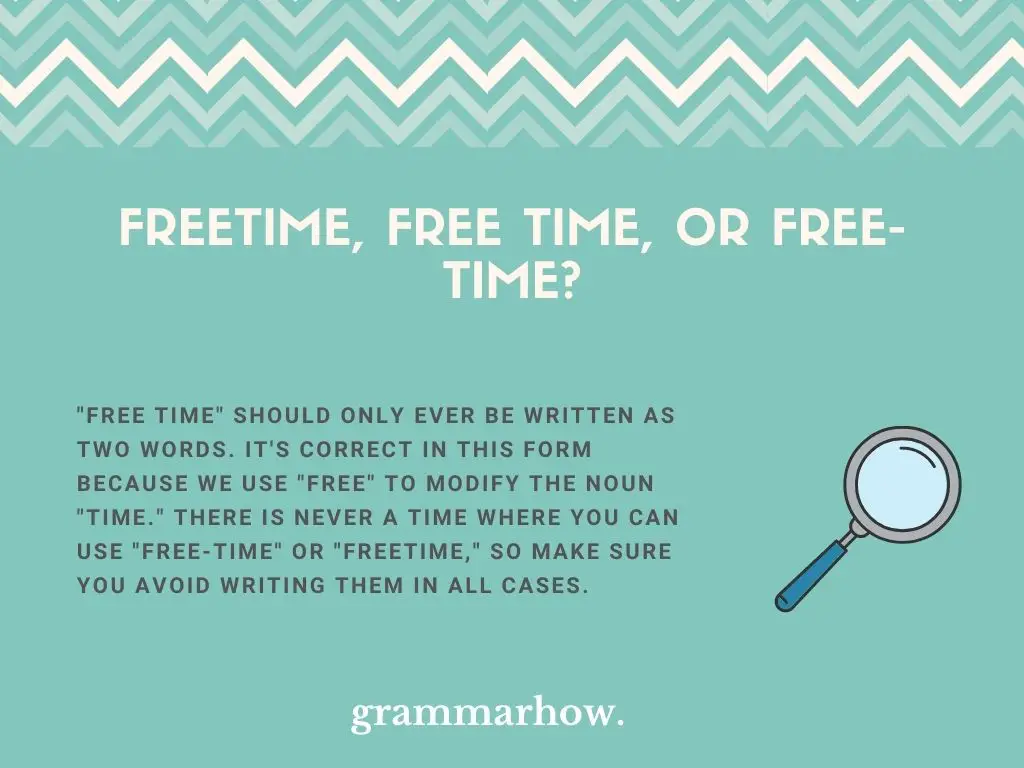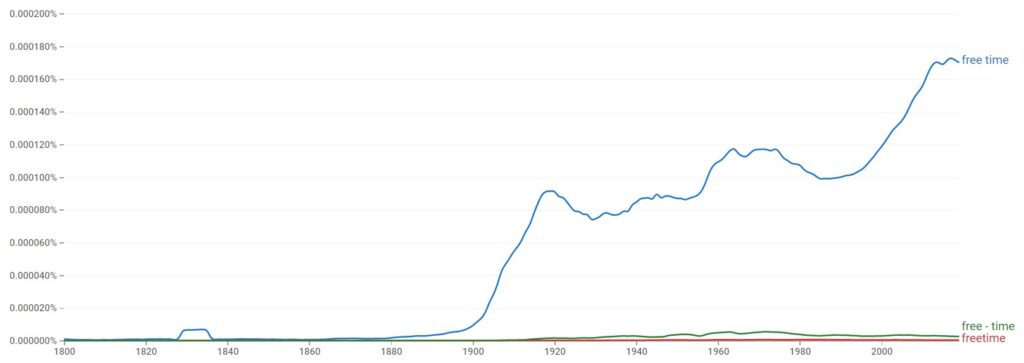When talking about “free time,” it would be useful to know whether it’s written as one or two words. You might find that it’s hyphenated in some cases, and this article will look into whether this form is correct.
Free time vs. Free-time vs. Freetime
“Free time” should only ever be written as two words. It’s correct in this form because we use “free” to modify the noun “time.” There is never a time where you can use “free-time” or “freetime,” so make sure you avoid writing them in all cases.

According to Google Ngram Viewer, “free time” is by far the most popular choice of the three. This shows that it’s the only grammatically correct form and thus should be the only one you should use.

In The Cambridge Dictionary, “free time” is given an official definition. This shows that the two words should remain separated whenever you are writing about “time” that someone has that is free for them to do whatever they want.
Remember, we keep the two words separate because “free” works as a modifier for “time.” We can treat “free” as an adjective and “time” as a noun, so the hyphenated and one-word options are incorrect.
Is “Freetime” One Word?
“Freetime” can never be written as one word. We must always keep them separated to make sure the definition of “free time” is made clear. The definition allows us to use “free” as a modifier, while “time” is the modified noun that we write about.
You might benefit from checking out some of these examples to see how it works:
- Correct: I don’t get a lot of free time anymore because I’m always occupied with work.
- Incorrect: Your freetime is of no concern to me! I expect you to get this work done.
- Correct: If you would like more free time, maybe you should try looking into more flexible working hours.
- Incorrect: I would love to get more freetime to go out and have a social life, but I just can’t do it!
Is “Free time” Two Words?
We write “free time” as two words because it allows us to define what we’re talking about properly. “Free” and “time” are used to modify each other to show that someone has a time where they do not have to work or study (which they can fill with whatever they want).
These examples should help you make more sense of it:
- Without free time, there isn’t much point in doing this job! I’d get bored out of my mind.
- Your free time is very important to you, which is why I want to reward you with some.
- I know that you don’t get much free time, so this won’t take too long!
- If you’re looking to get some free time out of the day, maybe you should look for another job!
Is “Free-time” Hyphenated?
“Free-time” should not be hyphenated. When we hyphenate words, we use them to modify another noun that comes after them. However, “free time” is already a phrasal noun, which means there is no need to modify another noun because we do not write about one.
We can refer to AP Style rules to show us that hyphenating “free-time” is incorrect. Since the two words are not used as modifiers, we do not need to group them with a hyphen.
Instead, “free” is already a modifier, and “time” is the noun that should be modified. That’s why hyphenation in this word is irrelevant.
Here are a few extra examples to remind you:
- Correct: If you have the free time, I would love for you to come by and see what I’m working on.
- Incorrect: My free-time is getting a bit out of hand, and I think I need to go back to work.
- Correct: Free time is the most precious thing in the world to me.
- Incorrect: If you’d like to meet up with me in your free-time, you should talk to your manager about getting some.
Is “Time” Capitalized In The Word “Free-Time”?
Unfortunately, the hyphenated form “free-time” is incorrect. Therefore, there is no need to talk about capitalization in the form.
However, “free time” still doesn’t need any capital letters when it is written correctly as two words. It is not a proper noun.

Martin holds a Master’s degree in Finance and International Business. He has six years of experience in professional communication with clients, executives, and colleagues. Furthermore, he has teaching experience from Aarhus University. Martin has been featured as an expert in communication and teaching on Forbes and Shopify. Read more about Martin here.
